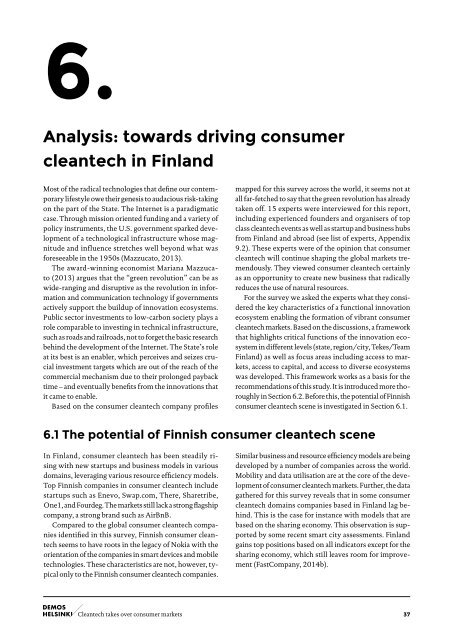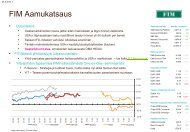Cleantech takes over consumer markets
Consumer_Cleantech_Report1
Consumer_Cleantech_Report1
- No tags were found...
Create successful ePaper yourself
Turn your PDF publications into a flip-book with our unique Google optimized e-Paper software.
6.<br />
Analysis: towards driving <strong>consumer</strong><br />
cleantech in Finland<br />
Most of the radical technologies that define our contemporary<br />
lifestyle owe their genesis to audacious risk-taking<br />
on the part of the State. The Internet is a paradigmatic<br />
case. Through mission oriented funding and a variety of<br />
policy instruments, the U.S. g<strong>over</strong>nment sparked development<br />
of a technological infrastructure whose magnitude<br />
and influence stretches well beyond what was<br />
foreseeable in the 1950s (Mazzucato, 2013).<br />
The award-winning economist Mariana Mazzucato<br />
(2013) argues that the “green revolution” can be as<br />
wide-ranging and disruptive as the revolution in information<br />
and communication technology if g<strong>over</strong>nments<br />
actively support the buildup of innovation ecosystems.<br />
Public sector investments to low-carbon society plays a<br />
role comparable to investing in technical infrastructure,<br />
such as roads and railroads, not to forget the basic research<br />
behind the development of the Internet. The State’s role<br />
at its best is an enabler, which perceives and seizes crucial<br />
investment targets which are out of the reach of the<br />
commercial mechanism due to their prolonged payback<br />
time – and eventually benefits from the innovations that<br />
it came to enable.<br />
Based on the <strong>consumer</strong> cleantech company profiles<br />
mapped for this survey across the world, it seems not at<br />
all far-fetched to say that the green revolution has already<br />
taken off. 15 experts were interviewed for this report,<br />
including experienced founders and organisers of top<br />
class cleantech events as well as startup and business hubs<br />
from Finland and abroad (see list of experts, Appendix<br />
9.2). These experts were of the opinion that <strong>consumer</strong><br />
cleantech will continue shaping the global <strong>markets</strong> tremendously.<br />
They viewed <strong>consumer</strong> cleantech certainly<br />
as an opportunity to create new business that radically<br />
reduces the use of natural resources.<br />
For the survey we asked the experts what they considered<br />
the key characteristics of a functional innovation<br />
ecosystem enabling the formation of vibrant <strong>consumer</strong><br />
cleantech <strong>markets</strong>. Based on the discussions, a framework<br />
that highlights critical functions of the innovation ecosystem<br />
in different levels (state, region/city, Tekes/Team<br />
Finland) as well as focus areas including access to <strong>markets</strong>,<br />
access to capital, and access to diverse ecosystems<br />
was developed. This framework works as a basis for the<br />
recommendations of this study. It is introduced more thoroughly<br />
in Section 6.2. Before this, the potential of Finnish<br />
<strong>consumer</strong> cleantech scene is investigated in Section 6.1.<br />
6.1 The potential of Finnish <strong>consumer</strong> cleantech scene<br />
In Finland, <strong>consumer</strong> cleantech has been steadily rising<br />
with new startups and business models in various<br />
domains, leveraging various resource efficiency models.<br />
Top Finnish companies in <strong>consumer</strong> cleantech include<br />
startups such as Enevo, Swap.com, There, Sharetribe,<br />
One1, and Fourdeg. The <strong>markets</strong> still lack a strong flagship<br />
company, a strong brand such as AirBnB.<br />
Compared to the global <strong>consumer</strong> cleantech companies<br />
identified in this survey, Finnish <strong>consumer</strong> cleantech<br />
seems to have roots in the legacy of Nokia with the<br />
orientation of the companies in smart devices and mobile<br />
technologies. These characteristics are not, however, typical<br />
only to the Finnish <strong>consumer</strong> cleantech companies.<br />
Similar business and resource efficiency models are being<br />
developed by a number of companies across the world.<br />
Mobility and data utilisation are at the core of the development<br />
of <strong>consumer</strong> cleantech <strong>markets</strong>. Further, the data<br />
gathered for this survey reveals that in some <strong>consumer</strong><br />
cleantech domains companies based in Finland lag behind.<br />
This is the case for instance with models that are<br />
based on the sharing economy. This observation is supported<br />
by some recent smart city assessments. Finland<br />
gains top positions based on all indicators except for the<br />
sharing economy, which still leaves room for improvement<br />
(FastCompany, 2014b).<br />
<strong>Cleantech</strong> <strong>takes</strong> <strong>over</strong> <strong>consumer</strong> <strong>markets</strong><br />
37






